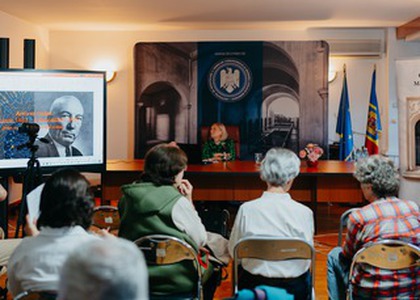> [Archived] Events

Reportage from the Antonin Ciolan conference. The Bădescu lot, proposed by the project “Houses of Musicians”
On Tuesday, October 31st 2023, the headquarters of the Institute for the Investigation of the Crimes of Communism and the Memory of the Romanian Exile in Bucharest hosted the second conference within the project "Houses of musicians. Dramas of the communist period", in the organization of the "Opus" Association.
Researcher Ioana Raluca Voicu-Arnăuțoiu, daughter of the anti-communist fighter Toma Arnăuțoiu, proposed a two-part communication to the public. To begin with, the researcher discussed the life and professional activity of conductor and teacher Antonin Ciolan. We learn that in 1944, theconductor's name was included on a list of 24 people accused of being war criminals, based on his previous work at the Odessa Opera. The actual reason for the arrest of these persons remains the fact that they were sent to the territory of Transnistria and assimilated as state officials. After a short release, in February 1945, a second arrest followed, despite the arguments that, in Odesa, Antonin Ciolan only carried out his activity as a conductor.
Ioana Raluca Voicu-Arnăuțoiu: "After more than seven months of uproar and suffering, in custody, under unfounded accusations, the conductor's dramatic story comes to an end. A modest man, Antonin Ciolan, who lived - as he pointed out with naive sincerity in all his memoirs - only for music, becomes the victim of an unclear and turbulent political situation, just because he briefly held the title of general musical director of the Odessa Opera. Those who appointed him aimed precisely at his professionalism, seriousness and, last but not least, his modesty and disinterest in money and rewards of any kind."
The second part of the conference concerned one of the most resounding processes of the Romanian artistic world from the communist period. It is about the trial of the four lyrical artists from the Romanian Opera in Bucharest, a file referred to as the "Bădescu lot". Held in the 1960s, the trial accused major personalities of the opera of legionary activity. Those targeted were Dinu Bădescu, Valentina Crețoiu, Șerban Tassian and Cornelia Gavrilescu, but also the pianist Viorica Cojocaru and the lawyer Ion Dolănescu. The artists had brilliant careers for almost two decades, but after the establishment of the communism regime, the fact that the four came from wealthy, bourgeois families of intellectuals drew on them the suspicion that they harbor hostile attitudes to the regime.
About the decision to arrest Dinu Bădescu, Ioana Raluca Voicu-Arnăuțoiu: "Corroborating all the data obtained by listening to conversations, pursuits, information notes, by the synthesis of December 19th 1960 on the individual informative action Bădescu Dinu, security officers Târziu and Arnăutu conclude, I quote: We propose the arrest of Bădescu Dinu for committing the action of conspiring against the social order, and in the preliminary investigation, the clarification of the reports regarding the fact that he is an agent of the British espionage will also be pursued.
The consequence of the conviction of the four artists was their removal from the country's musical and cultural scene. The closing of the file was not followed by the cessation of the preparation of informative notes concerning the four artists, the last references to this file dates back in 1989.
Also, Ioana Voicu-Arnăuțoiu introduced to the public images of the buildings where Dinu Bădescu, Viorica Cojocaru, Valentina Crețoiu and Șerban Tassian lived. Those present at the conference were also able to view the exhibition "Musicians in the C.N.S.A.S. archive" proposed by the "George Enescu" Museum.
At the end of the conference, I gathered impressions from the audience:
"I have known Mrs. Arnăuțoiu from the National University of Music. She is an amazing person and everything she does regarding her work as a musician and as a historical researcher, is fantastic. I don't know how many people would put in so much effort and emotionally strain themselves. These things that we heard today and last Wednesday should also be heard by the younger generations." - Adina Dumitrescu, composer
"Mrs. Arnăuțoiu, with tenacity, seeks to provide for those who come behind, the younger generation in particular, evidence that a regime can be on top polished with many beautiful, noble feelings, but underneath it's a cancerous disease that leads in the end to metastases, as was the communist regime." - Tudor Peiu, priest
Photo credit: Andra Aron
Translated by Constantin Grigorescu,
University of Bucharest, Faculty of Foreign Languages and Literatures, MTTLC, year I
Corrected by Silvia Petrescu














